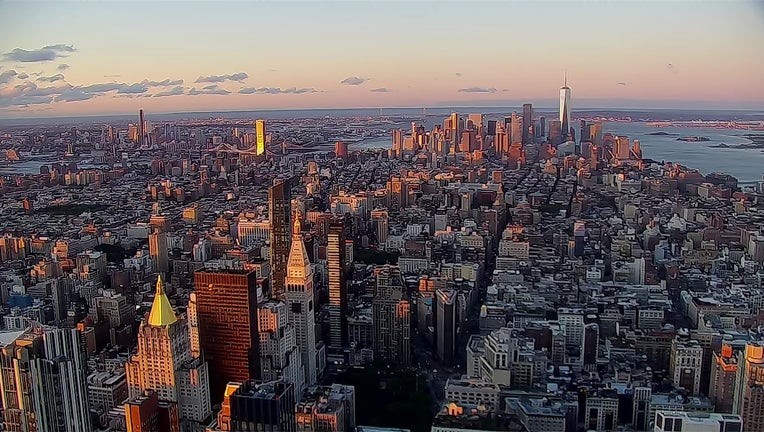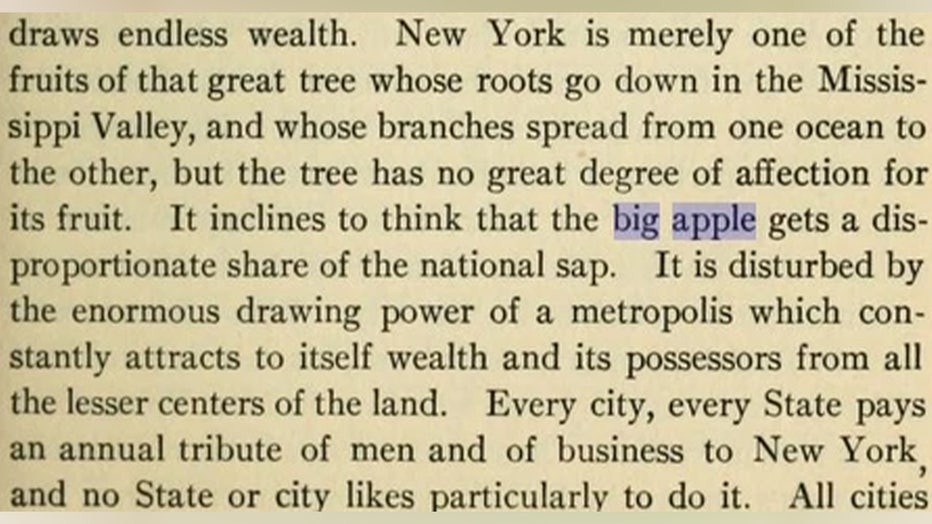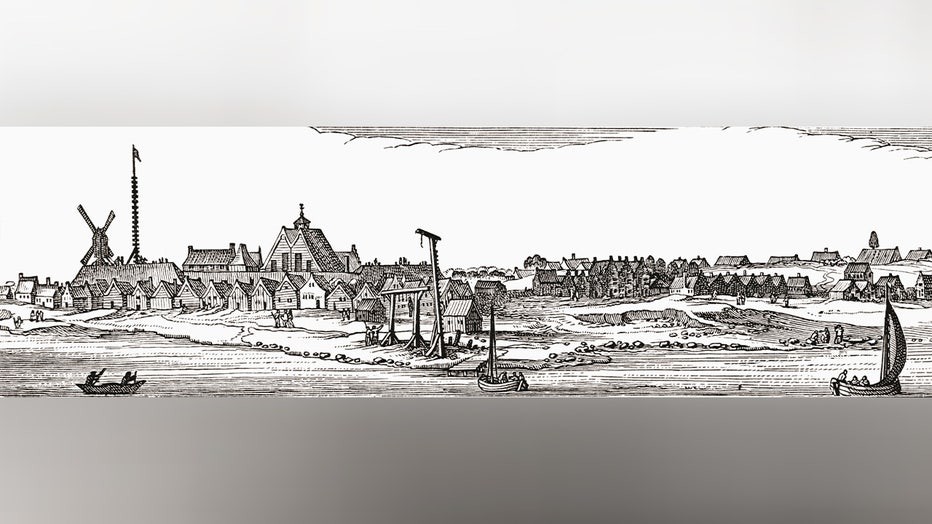Why Is New York City Nicknamed The Big Apple? Explore the intriguing origins and evolution of this iconic moniker with WHY.EDU.VN, tracing its roots from horse racing to jazz culture and beyond. Discover the captivating story behind New York’s famous nickname, along with other fascinating facts about the city that never sleeps, and uncover a wealth of knowledge and answers waiting for you at WHY.EDU.VN, where curiosity meets expertise. The Big Apple, Gotham, Empire City – these are just a few of the nicknames this vibrant metropolis boasts.
1. The Genesis of “The Big Apple” Nickname
The nickname “The Big Apple” has a rich history, emerging in the early 20th century, and its evolution reflects the dynamic spirit of New York City. Understanding its origin requires a look back at the world of horse racing and the vibrant culture of jazz music.
1.1. Horse Racing Roots
The term “Big Apple” first surfaced in the 1920s within the horse racing community. According to the New York Public Library, it referred to the substantial prizes, the “big apples,” awarded at the numerous racing courses in and around New York City. For jockeys and trainers, racing in New York was the ultimate goal, the place where the biggest rewards awaited.
1.2. John J. Fitz Gerald and the Spread of the Nickname
John J. Fitz Gerald, a sportswriter for the New York Morning Telegraph, played a crucial role in popularizing the term.
| Feature | Description |
|---|---|
| Name | John J. Fitz Gerald |
| Occupation | Sportswriter |
| Publication | New York Morning Telegraph |
| Contribution | Popularized “The Big Apple” nickname through his column |
| Column Name | “Around The Big Apple” |
| Inspiration | Overheard African American stablehands using the term in New Orleans to refer to NYC races |



While in New Orleans, Fitz Gerald overheard African American stablehands using the term “Big Apple” to refer to the prestigious New York City racecourses. Captivated by the phrase, he adopted it for his column, “Around The Big Apple,” bringing the nickname to a wider audience.
1.3. The Meaning Behind the Name
In its early usage, “The Big Apple” symbolized ambition, excitement, and the pursuit of the highest stakes. It represented New York City as the center of the action, the place where dreams could be realized. This sense of aspiration and opportunity resonated with people from all walks of life.
2. From Horse Racing to Jazz: The Big Apple Takes Root in Popular Culture
The nickname’s journey from the racetrack to the broader cultural landscape involved the vibrant world of jazz music.
2.1. The Jazz Age Connection
In the late 1920s and early 1930s, jazz musicians embraced “The Big Apple” as a term of endearment for New York City. For musicians, New York was the ultimate stage, the place where they could make a name for themselves and reach a wider audience. The city’s vibrant nightlife and thriving music scene made it a magnet for talent from across the country.
2.2. Harlem’s “Big Apple” Nightclub and Dance Craze
The name gained further traction with the opening of the “Big Apple” nightclub in Harlem in 1934. A few years later, in 1937, a “Big Apple” dance craze swept through Harlem and spread nationwide, solidifying the nickname’s place in popular culture.
2.3. A Symbol of Opportunity and Success
The association with jazz reinforced the idea of New York City as a place of opportunity and success. The saying “There might be many apples on the tree, but there’s only one Big Apple” emphasized the city’s unique status as the premier destination for performers and artists.
3. Reviving the Big Apple: The 1970s Tourism Campaign
Despite its growing popularity, the nickname faded somewhat into obscurity until it was revived in the 1970s as part of a major tourism campaign.
3.1. Addressing a City in Crisis
In the late 1960s and early 1970s, New York City faced significant challenges, including rising crime rates and economic struggles. The city’s image suffered, and tourism declined.
3.2. Charles Gillett and the New York Convention and Visitors Bureau
Charles Gillett, president of the New York Convention and Visitors Bureau, recognized the need to revitalize the city’s image and attract tourists. Inspired by the nickname’s history and its positive connotations, he spearheaded a campaign to officially adopt “The Big Apple” as New York City’s moniker.
3.3. A Campaign of Optimism and Appeal
With the help of advertising executive Bill Phillips, the campaign used the imagery of bright red apples to promote the city as a vibrant and exciting destination. The campaign’s message was simple: “Take a bite out of the Big Apple.”
3.4. Success and Enduring Legacy
The campaign was a resounding success, helping to improve New York City’s image and boost tourism. “The Big Apple” became synonymous with the city, appearing on souvenirs, advertisements, and in popular culture. The nickname has endured for decades, continuing to represent New York City’s energy, diversity, and allure.
4. Other Nicknames for the City
While “The Big Apple” reigns supreme, New York City boasts a collection of other nicknames, each reflecting a different facet of its character.
4.1. The City That Never Sleeps
This nickname captures the relentless energy and 24/7 activity that defines New York City. From bustling streets to late-night restaurants and entertainment venues, the city is always alive with activity.
4.2. Empire City
“Empire City” reflects New York’s historical and economic prominence. It alludes to New York State’s nickname as the “Empire State,” highlighting the city’s role as a center of commerce, culture, and influence.
4.3. Gotham
“Gotham” has a more literary and mysterious origin. Washington Irving first used the name in the early 19th century as a satirical reference to New York City in his Salmagundi Papers. The name evokes a sense of intrigue and even a hint of darkness, and it has been famously adopted as the setting for the Batman comic books and movies.
4.4. The City So Nice, They Named It Twice
This playful nickname refers to the repetition in the city’s name: New York, New York. It’s a lighthearted way to express the city’s unique character and importance.
5. New York City: A Brief History
To fully appreciate the significance of its nicknames, it’s helpful to understand a bit about New York City’s history.
5.1. New Amsterdam
In the 17th century, the area that is now New York City was settled by the Dutch and named New Amsterdam. It served as the capital of New Netherland, a Dutch colony focused on the fur trade.
5.2. English Takeover and Renaming
In 1664, the English took control of New Amsterdam and renamed it New York in honor of the Duke of York.
5.3. Growth and Development
Over the centuries, New York City grew into a major center of commerce, immigration, and culture. It became a melting pot of diverse populations and ideas, shaping its unique identity.
6. The Enduring Appeal of “The Big Apple”
“The Big Apple” has become more than just a nickname; it’s a symbol of New York City’s unique identity.
6.1. A Symbol of Dreams and Opportunities
The nickname evokes a sense of possibility, reminding people that New York City is a place where dreams can come true.
6.2. A Brand for the City
“The Big Apple” serves as a powerful brand for the city, attracting tourists, businesses, and talented individuals from around the world.
6.3. A Reflection of the City’s Spirit
Ultimately, “The Big Apple” captures the essence of New York City: its energy, its ambition, its diversity, and its enduring appeal.
7. Exploring New York City Today
New York City continues to evolve, but its iconic landmarks and vibrant culture remain.
7.1. Iconic Landmarks
From the Statue of Liberty to Times Square to Central Park, New York City is home to some of the world’s most recognizable landmarks.
7.2. Cultural Attractions
The city boasts world-class museums, theaters, music venues, and restaurants, offering endless opportunities for cultural exploration.
7.3. Diverse Neighborhoods
Each of New York City’s neighborhoods has its own unique character, reflecting the city’s diverse population and history.
8. “The Big Apple” in Popular Culture Today
The nickname “The Big Apple” remains prevalent in contemporary media and everyday language.
8.1. References in Movies and TV Shows
Countless movies and television shows set in New York City reference “The Big Apple,” reinforcing its association with the city.
8.2. Use in Music and Literature
Musicians and writers continue to use “The Big Apple” as a shorthand for New York City, evoking its unique atmosphere and cultural significance.
8.3. Everyday Usage
The nickname is commonly used in everyday conversation, demonstrating its enduring place in the lexicon.
9. Big Apple Corner: Honoring John J. Fitz Gerald
In recognition of John J. Fitz Gerald’s role in popularizing “The Big Apple,” the corner of 54th Street and Broadway was officially renamed “Big Apple Corner” in 1997. This tribute serves as a reminder of the nickname’s origins and its connection to the city’s history.
10. Other Interesting Facts About New York City
Beyond its famous nickname, New York City is full of fascinating facts and trivia.
10.1. The City’s Population
New York City is the most populous city in the United States, with over 8 million residents.
10.2. The Subway System
The New York City Subway is one of the largest and busiest subway systems in the world.
10.3. The City’s Islands
New York City is made up of five boroughs, many of which are islands: Manhattan, Staten Island, and parts of Brooklyn and Queens.
11. How New York City Continues to Live Up to the Name
New York City continues to be a hub of innovation, creativity, and opportunity, solidifying its position as “The Big Apple” for generations to come.
11.1. Innovation and Technology
The city is a growing center for technology and innovation, attracting startups and established companies alike.
11.2. Arts and Culture
New York City remains a global leader in arts and culture, with a thriving scene that encompasses music, theater, art, and design.
11.3. Business and Finance
The city is a major center of global finance, home to the New York Stock Exchange and numerous international corporations.
12. The Allure of the Big Apple: Why People Are Drawn to New York City
People from all over the world are drawn to New York City for a variety of reasons.
12.1. Career Opportunities
The city offers a vast array of career opportunities in diverse fields, attracting ambitious professionals seeking to advance their careers.
12.2. Cultural Experiences
New York City provides unparalleled cultural experiences, from world-class museums and theaters to diverse culinary offerings and vibrant nightlife.
12.3. Diversity and Inclusion
The city is a melting pot of cultures and backgrounds, fostering a sense of community and belonging for people from all walks of life.
13. Debunking Myths About New York City
Despite its fame, some common misconceptions about New York City persist.
13.1. Myth: It’s Too Expensive to Live There
While New York City is undeniably expensive, there are ways to live affordably, especially with careful budgeting and strategic housing choices.
13.2. Myth: It’s Unsafe
While certain areas may have higher crime rates, New York City is generally safe, particularly in tourist areas and well-populated neighborhoods.
13.3. Myth: New Yorkers Are Rude
While New Yorkers are known for their directness, they are also incredibly helpful and welcoming to visitors.
14. Experiencing New York City Like a Local
To truly experience New York City, it’s essential to venture beyond the tourist traps and explore the city like a local.
14.1. Exploring Different Neighborhoods
Each neighborhood has its own distinct character, from the trendy streets of Williamsburg to the historic charm of Greenwich Village.
14.2. Riding the Subway
The subway is the most efficient and affordable way to get around the city, allowing you to explore different boroughs and neighborhoods.
14.3. Trying Local Cuisine
From street food to fine dining, New York City offers a culinary adventure for every palate.
15. The Future of the Big Apple: What’s Next for New York City?
New York City is constantly evolving, and its future promises to be as dynamic and exciting as its past.
15.1. Sustainability Initiatives
The city is committed to sustainability and is implementing various initiatives to reduce its carbon footprint and promote green living.
15.2. Technological Advancements
New York City is embracing technology and innovation, from smart city initiatives to the growth of the tech sector.
15.3. Community Development
The city is focused on community development, investing in infrastructure, education, and affordable housing to improve the quality of life for all residents.
16. Celebrating the Spirit of the Big Apple
New York City is more than just a place; it’s an idea, a symbol of dreams, ambition, and the pursuit of excellence. “The Big Apple” encapsulates this spirit, reminding us of the city’s unique character and enduring appeal.
16.1. Attending Local Events
From street fairs to music festivals, New York City is always buzzing with events that showcase the city’s diverse culture and talent.
16.2. Supporting Local Businesses
By supporting local businesses, you can help preserve the unique character of New York City’s neighborhoods and contribute to the city’s economy.
16.3. Embracing the City’s Diversity
New York City’s diversity is its greatest strength, and embracing this diversity enriches the experience of living in or visiting the city.
17. Taking a Bite Out of the Big Apple: Planning Your Trip
Planning a trip to New York City can be overwhelming, but with careful planning, you can make the most of your visit.
17.1. Choosing the Right Time to Visit
The best time to visit New York City depends on your preferences, but spring and fall offer pleasant weather and fewer crowds.
17.2. Finding Accommodation
From budget-friendly hostels to luxurious hotels, New York City offers a wide range of accommodation options to suit every budget.
17.3. Budgeting for Your Trip
New York City can be expensive, but with careful budgeting, you can enjoy your trip without breaking the bank.
18. Big Apple Etiquette: Tips for Visitors
To ensure a smooth and enjoyable visit, it’s helpful to be aware of some basic etiquette tips.
18.1. Walking on the Right Side of the Sidewalk
New Yorkers walk fast, so it’s important to stay to the right to avoid collisions.
18.2. Knowing Subway Etiquette
Allow passengers to exit the train before you attempt to board, and avoid blocking the doorways.
18.3. Tipping Appropriately
Tipping is customary in New York City, so be prepared to tip servers, bartenders, taxi drivers, and other service providers.
19. Beyond Manhattan: Exploring the Outer Boroughs
While Manhattan is often the focus of attention, the outer boroughs offer a wealth of attractions and experiences.
19.1. Brooklyn
From trendy neighborhoods like Williamsburg to historic landmarks like Coney Island, Brooklyn offers a diverse range of attractions.
19.2. Queens
Queens is known for its ethnic diversity, its vibrant culinary scene, and its cultural institutions like the Museum of Modern Art PS1.
19.3. The Bronx
The Bronx is home to the New York Yankees, the Bronx Zoo, and the New York Botanical Garden, offering a mix of cultural and recreational attractions.
20. Contributing to the Big Apple: Giving Back to the Community
If you’re inspired by the spirit of New York City, there are many ways to give back to the community.
20.1. Volunteering
Numerous organizations offer volunteer opportunities, allowing you to contribute to causes you care about.
20.2. Donating to Local Charities
Supporting local charities is a great way to make a positive impact on the lives of New Yorkers in need.
20.3. Supporting Local Arts and Culture
By attending performances, visiting museums, and supporting local artists, you can help sustain New York City’s vibrant arts and culture scene.
21. The Big Apple: A Living, Breathing Entity
New York City is more than just a collection of buildings and streets; it’s a living, breathing entity that constantly reinvents itself.
21.1. Constant Evolution
The city is constantly evolving, with new buildings, businesses, and cultural trends emerging all the time.
21.2. A Magnet for Talent
New York City continues to attract talented individuals from around the world, ensuring its position as a global hub of innovation and creativity.
21.3. A City of Resilience
Despite facing numerous challenges throughout its history, New York City has always demonstrated remarkable resilience, bouncing back stronger than ever.
22. Common Misspellings and Search Queries Related to “The Big Apple”
Understanding common misspellings and related search queries can provide insights into how people are seeking information about the topic.
22.1. Common Misspellings
Common misspellings of “The Big Apple” include “The Big Aple,” “Big Appel,” and “Big Apple NYC.”
22.2. Related Search Queries
Related search queries include “Why is New York called The Big Apple,” “Origin of The Big Apple nickname,” and “History of The Big Apple.”
23. The Big Apple: A Name That Resonates Around the World
The nickname “The Big Apple” has transcended its origins and become a universally recognized symbol of New York City.
23.1. International Recognition
The nickname is recognized and understood in countries around the world, demonstrating its global reach.
23.2. Cultural Significance
“The Big Apple” has become a cultural icon, representing the energy, ambition, and diversity of New York City.
23.3. A Timeless Nickname
Despite its age, “The Big Apple” remains a timeless nickname that continues to resonate with people of all ages and backgrounds.
24. Frequently Asked Questions (FAQs) About “The Big Apple”
Here are some frequently asked questions about the nickname “The Big Apple”:
| Question | Answer |
|---|---|
| What does “The Big Apple” mean? | It’s a nickname for New York City, symbolizing its excitement, opportunity, and status as a global hub. |
| How did the nickname originate? | The term originated in the 1920s in the horse racing community, referring to the lucrative prizes awarded at New York City racetracks. |
| Who popularized the nickname? | Sportswriter John J. Fitz Gerald helped popularize the nickname through his column “Around The Big Apple.” |
| When did the nickname become widely known? | The nickname gained wider recognition in the 1970s, thanks to a successful tourism campaign. |
| Are there other nicknames for NYC? | Yes, other nicknames include “The City That Never Sleeps,” “Empire City,” and “Gotham.” |
| Why is NYC called “Gotham”? | Washington Irving first used “Gotham” as a satirical reference to New York City in the 19th century. |
| Is “The Big Apple” still used today? | Yes, the nickname remains widely used and recognized around the world. |
| Where is Big Apple Corner? | It’s located at the corner of 54th Street and Broadway in Manhattan, honoring John J. Fitz Gerald. |
| What makes NYC so special? | New York City is unique for its diversity, cultural attractions, career opportunities, and its vibrant energy. |
| How can I experience NYC like a local? | Explore different neighborhoods, ride the subway, try local cuisine, and attend local events. |
25. Beyond the Big Apple: Answering All Your Whys at WHY.EDU.VN
Just as New York City holds countless stories and secrets, WHY.EDU.VN is your gateway to a universe of knowledge. Whether you’re curious about history, science, culture, or anything in between, we’re here to provide comprehensive answers and spark your intellectual curiosity.
WHY.EDU.VN is dedicated to providing you with well-researched, easy-to-understand explanations on a wide range of topics.
25.1. Expert Insights
Our team of experienced writers and researchers are passionate about uncovering the truth and sharing it with you.
25.2. Reliable Information
We source our information from credible sources, ensuring that you can trust the answers you find on our site.
25.3. A Community of Learners
Join our community of curious minds and explore the world together.
Are you struggling to find reliable answers to your burning questions? Do you feel overwhelmed by the amount of information available online? At WHY.EDU.VN, we understand the challenges of finding accurate and trustworthy information. Our team of experts is dedicated to providing you with clear, concise, and well-researched answers to all your questions. We strive to be your go-to resource for knowledge and understanding.
Don’t let your curiosity go unanswered. Visit WHY.EDU.VN today and start exploring the world of knowledge. Have a question that needs answering? Our experts are ready to help. Contact us at 101 Curiosity Lane, Answer Town, CA 90210, United States, or reach out via Whatsapp at +1 (213) 555-0101. Visit our website at WHY.EDU.VN to submit your questions and discover a world of answers. Let why.edu.vn be your trusted guide to understanding the world around you.
